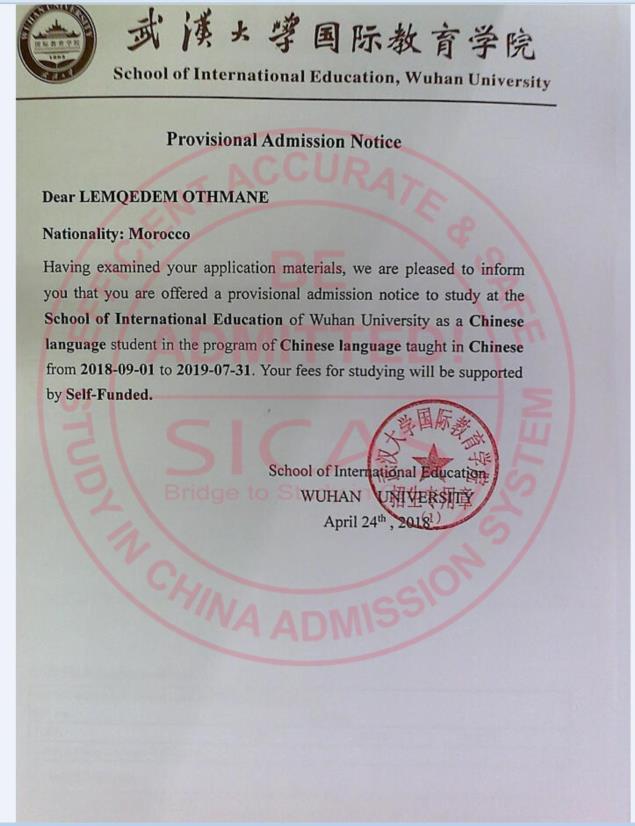The requirements for international students at Wuhan University include academic qualifications, language proficiency, financial stability, visa criteria, and medical clearance.
Table of Contents

Application Process
Online Application
To apply to Wuhan University, you first need to go through the online application portal provided by the university. Here’s a step-by-step guide:
- Open the Wuhan University application portal and register for an account.
- After receiving the verification email, log in to your account.
- Fill in the application form with your personal details, academic background, and program preferences.
- Double-check all entered information for accuracy before submitting the form.
Required Documentation
The next stage involves preparing and submitting the necessary documents. Ensure that you have all of the following ready:
- High School Diploma or Equivalent: For undergraduate courses, you’ll need to provide your high school diploma or its equivalent.
- Transcripts: Academic records from the last educational institution you attended.
- Letter of Recommendation: At least two for postgraduate courses.
- Statement of Purpose: A detailed essay explaining why you want to study at Wuhan University.
- Language Proficiency Certificate: Either an IELTS or TOEFL score for English-taught programs. A HSK level certificate for Chinese-taught programs.
Academic Requirements
Undergraduate Programs
- High School Diploma or Equivalent: Must be from an accredited institution.
- High School GPA: Usually a minimum requirement, such as 3.0 on a 4.0 scale.
- Standardized Tests: Some programs may require SAT or ACT scores.
- Additional Exams: Depending on the program, additional subject tests may be necessary.

Postgraduate Programs
- Bachelor’s Degree: Must be in a related field and from an accredited university.
- Undergraduate GPA: Usually a minimum requirement, such as 3.0 on a 4.0 scale.
- Recommendation Letters: At least two, preferably from academic referees.
- Standardized Tests: GRE or GMAT may be required depending on the program.
PhD Programs
- Master’s Degree: Must be in a related field and from an accredited university.
- Master’s GPA: Usually a minimum requirement, such as 3.0 on a 4.0 scale.
- Recommendation Letters: At least three, preferably from academic referees.
- Research Proposal: A detailed research proposal in the chosen field of study.
Here is the information organized into a table:
| S.No | Academic Level | Key Requirements | Remarks |
|---|---|---|---|
| 1 | Undergraduate | High School Diploma, GPA, Standardized Tests | GPA and test scores vary by program |
| 2 | Postgraduate | Bachelor’s Degree, GPA, Recommendation Letters, Standardized Tests | GRE or GMAT may be required |
| 3 | PhD | Master’s Degree, GPA, Recommendation Letters, Research Proposal | Minimum GPA and specific requirements vary |
Language Proficiency Requirements
English-Taught Programs
If you aim to enroll in an English-taught program, demonstrating your proficiency in English is crucial. Here’s how to do it:
- IELTS: Most English-taught programs require an IELTS score, typically a minimum of 6.0 or 6.5.
- TOEFL: Alternatively, a TOEFL score is also accepted. The minimum score generally ranges from 80 to 100 depending on the program.
- Native English Speakers: If you are a native English speaker, or have completed your previous education in English, you may be exempt from these requirements.
- University’s English Proficiency Test: Some programs offer the option to take the university’s own English proficiency test if you don’t have IELTS or TOEFL scores.
Chinese-Taught Programs
For programs taught in Chinese, your proficiency in the language will be evaluated primarily through the HSK (Hanyu Shuiping Kaoshi) levels:
- HSK Level 4: This is usually the minimum requirement for undergraduate programs.
- HSK Level 5 or 6: For postgraduate and PhD programs, a higher HSK level is usually required.
- Native Chinese Speakers: If you are a native speaker, or have previously studied in a Chinese educational institution, you may be exempt from HSK requirements.
- University’s Chinese Proficiency Test: Like with English programs, some Chinese-taught programs also offer the option to take the university’s own proficiency test.
Financial Requirements
Tuition Fees
Knowing the cost of tuition is crucial in planning your studies at Wuhan University. Here are the typical expenses:
- Undergraduate Programs: Tuition fees usually range from $3,000 to $10,000 per academic year.
- Postgraduate Programs: Fees generally range between $4,000 and $12,000 per academic year.
- PhD Programs: Tuition tends to be between $6,000 and $15,000 per academic year.
Living Expenses
Living costs can vary depending on your lifestyle and choice of accommodation. Here are some points to consider:
- On-Campus Housing: Usually costs around $200 to $500 per month.
- Off-Campus Housing: Rent can range from $300 to $800 per month depending on location and amenities.
- Food and Groceries: Average monthly expense is around $100 to $300.
- Transportation: Public transportation like buses and subways are relatively inexpensive, costing around $30 to $50 per month.
Scholarships and Financial Aid
Wuhan University offers various types of financial aid to help mitigate the cost of education. Here are some options:
- Government Scholarships: Scholarships like the CSC Scholarship can cover both tuition and living expenses.
- University Scholarships: Wuhan University also has its own scholarship programs, which can range from partial to full tuition coverage.
- External Scholarships: Organizations and foundations sometimes offer scholarships applicable to Wuhan University.
Visa Requirements
Types of Visas
For studying in China, you generally have two main types of visas to consider:
| Visa Type | Description | Duration | Applicability |
|---|---|---|---|
| X1 Visa | For long-term study, more than 6 months | Up to 5 years | Undergraduate, Postgraduate, and PhD Programs |
| X2 Visa | For short-term study, less than 6 months | Up to 6 months | Language courses, summer programs |
Application Procedure
Here’s a general guide to applying for a Chinese student visa:
- Acceptance Letter: First, you’ll need to receive an official acceptance letter from Wuhan University.
- Visa Application Form: Fill in the Visa Application Form, also known as JW201 or JW202 form, provided by the university.
- Book an Appointment: Schedule a visa interview at the nearest Chinese embassy or consulate.
- Attend Interview: Go to the embassy or consulate on the scheduled date and time for your interview.

Required Documents for Visa Application
To complete your visa application, the following documents are generally needed:
- Passport: It should be valid for at least six months from your planned date of entry.
- Photographs: Passport-sized photographs as per embassy guidelines.
- Application Form: The JW201 or JW202 form.
- Acceptance Letter: From Wuhan University.
- Financial Proof: Evidence of sufficient funds to cover tuition and living expenses.
Medical Requirements
Medical Examinations
Being physically fit is a prerequisite for a smooth academic experience at Wuhan University. Before arriving in China or shortly after your arrival, you will usually be required to undergo a medical examination. Here are the steps:
- Contact a Certified Hospital: This should be a hospital that is certified to conduct examinations for international travelers.
- Complete a Full Body Check: The tests generally include blood tests, an ECG, and a chest X-ray.
- Receive Medical Certificate: If all checks are satisfactory, you’ll receive a medical certificate that you need to submit to the university.
Vaccination Records
China has specific vaccination requirements for incoming students to protect public health. Make sure you have the following:
- Routine Vaccines: Make sure your routine vaccines like MMR, DTP, and varicella are up to date.
- Hepatitis A and B: These vaccines are often required for long-term stays in China.
- Yellow Fever: If you’re coming from a country where yellow fever is prevalent, you might need to show proof of vaccination.
- Provide Records: Maintain a record of your vaccinations, usually in the form of an International Certificate of Vaccination or Yellow Card.

